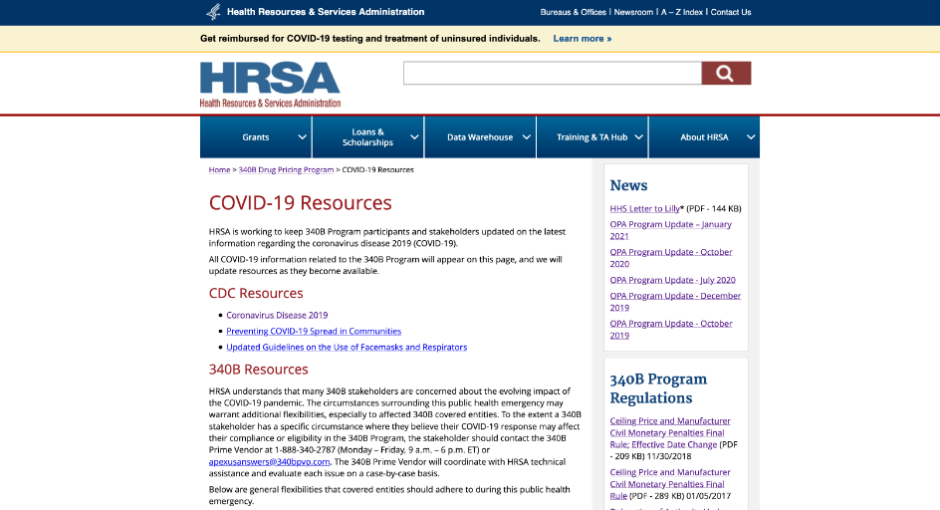The acting head of the U.S. Health and Human Services Department (HHS) told state governors on Friday that the national COVID-19 public health emergency (PHE) is expected to last through the end of the year. That likely means 340B program flexibilities being granted in response to COVID-19 also will stay in place for all of 2021.
On Jan. 7, now ex-HHS Secretary Alex Azar renewed the COVID-19 emergency declaration for 90 days or until the need for emergency ends, whichever comes first. The extension took effect Jan. 21.
“To assure you of our commitment to the ongoing response, we have determined that the PHE will likely remain in place for the entirety of 2021, and when a decision is made to terminate the declaration or let it expire, HHS will provide states with 60 days’ notice prior to termination,” HHS Acting Secretary Norris Cochran told governors in a Jan. 22 letter.
Cochran said HHS “will consider the use of any available flexibility to aid states in their response to this PHE.”
In March, the U.S. Health Resources and Services Administration added a page to the 340B program website describing “general flexibilities that covered entities should adhere to during this public health emergency.” In June, it said two flexibilities described on the page—regarding use of telehealth in 340B, and use of 340B drugs in offsite outpatient facilities not yet listed as reimbursable on a hospital’s most recently filed Medicare cost report—were not just for the duration of the COVID-19 public health emergency but permanent.
340B program flexibilities allowed and denied during the COVID-19 emergency include:
- HRSA is letting some entities, upon request and review, enroll immediately in 340B.
- It is considering exemptions to 340B site registration requirements on a case-by-case basis.
- It is not waiving the Medicare disproportionate share (DSH) adjustment percentage requirement for certain hospitals to participate in 340B.
- It has not relaxed 340B statutory patient definition requirements related to diversion, but is granting some recordkeeping flexibilities.
- It has not relaxed 340B statutory requirements prohibiting DSH, children’s, and free-standing cancer hospitals from obtaining 340B covered outpatient drugs through a group purchasing organization (GPO). It said on the COVID-19 resources page, however, that if a hospital cannot buy a covered drug at the 340B price or wholesale acquisition cost “due to shortages, it may use a GPO (or GPO private label products). Hospitals do not need to report this information to HRSA under the COVID-19 public health emergency. The covered entity should address these situations in their policies and procedures and it must continue to keep auditable records.”
- It told drug manufacturers to contact HRSA if they wish to make private label products that are covered outpatient drugs available to covered entities at or below the 340B price.
- It is conducting covered entity audits remotely, and in some cases has granted entities chosen for audits extra time to respond to deadlines.
We asked HRSA yesterday if it is considering making remote audits a permanent option or the default mode of conducting audits.
“Since the beginning of the COVID-19 pandemic, HRSA has moved towards conducting 340B Program covered entity audits remotely (virtually),” HRSA said. “Covered entities are encouraged to continue to work with the Bizzell Group who is coordinating with HRSA. HRSA will continue to monitor and assess the COVID-19 response and provide updates accordingly.”
Bills were introduced, but not passed, in the last session of Congress to protect hospitals from losing their 340B eligibility during the pandemic due to changes in their DSH percentage, and to waive the 340B hospital GPO prohibition during the emergency. They have not yet been reintroduced in the 117th Congress.


